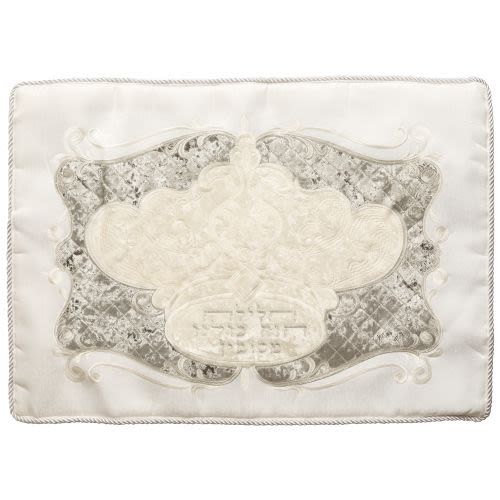
No Prayer Left Behind
Hashem says “This person is thanking Me for his troubles! He's going above his nature. Therefore I'm going to send a miraculous salvation that transcends nature”…

The Conduit for Salvation
Due to our sins, there are times when our prayers cannot ascend. Prosecuting angels may intercept the prayers and disqualify them, claiming that the supplicant is unworthy. However, no one has permission to interfere with a message of gratitude destined for the King. Words of thanksgiving are treasured by Hashem especially when a person is undergoing tough times. This type of prayer evokes great Divine compassion.
In a recent weekly Torah publication, Rabbi Elimelech Biederman cites the Bnei Issachar who explains in his commentary on Psalm 118:21 that the literal translation is, “I thank You because you answered me, and I had a salvation.” The Bnei Issachar translates the Hebrew word anitani as “affliction” and ki as “when.” Thus the verse is also saying: “I thank you when I am being afflicted, and thereby I receive my salvation.”
Earlier in Psalm 118 it says, “The sound of rejoicing and salvation is in the tents of the righteous”. The Vilna Gaon comments that it appears this is out of order. Logically, you would expect to see the salvation before the rejoicing. He therefore explains that the joyful songs of praise and thanksgiving are the actual cause of the salvation.
When we thank Hashem during the course of difficult tribulations, we are going above our nature. Hashem says, “This person is thanking Me! He’s going above his nature. Therefore I’m going to send a miraculous salvation that transcends nature.”
Gratitude = Holiness
In the emuna CD, The Open Gate, Rabbi Lazer Brody quotes the Baal Ha Tanya who says that when we thank Hashem we ascend in holiness. The Hebrew word for thanks is toda and the word for holiness is kedusha. Both these words have the numerical value of 415. Moreover, thanking Hashem is a pure act of giving. We are not asking for anything. In this way we are emulating Hashem who is pure Giver. This evokes tremendous Divine favor.
Rabbi Brody conveys the teaching of Rabbi Shalom Arush, that when one receives a salvation he should continue thanking Hashem. This causes the gates of salvation to remain wide open. In this way he will sustain his spiritual ascent and experience continuous success and blessings.
I Said Thank You and Saw Miracles
I’m currently reading Rabbi Arush’s book Garden of Miracles. This book is packed with 190 uplifting stories of people who said thank you during difficult tribulations and were blessed with miraculous salvations. Rabbi Arush explains the importance of expressing gratitude and how to make this a vital and dynamic part of our lives.
Rabbi Arush writes that we learn from the sin of the spies the devastating effects of crying and complaining. This is because crying and complaining is the total opposite of emuna.
A good measure is five hundred times more powerful than a bad measure. With that in mind, as damaging as crying and complaining is, the good of gratitude is five hundred times stronger! No wonder that gratitude elicits miracles and salvations beyond anything we can imagine.
Why So Many Stories?
This past Friday night I read an emuna story at the Shabbat table. One of my teenagers said, “Abba, nice story, but why do you tell us so many stories like this?” This was precisely the question I was hoping to hear!
The world operates in a way that camouflages the involvement of Hashem. It appears that things occur due to natural forces or human deeds. Reading real life stories of emuna instill a realization that there is no One but Hashem and everything that happens is from Him.
Ingratitude is like a weed. It sprouts naturally. However, gratitude is like a rose bush which has to be planted, watered, and carefully cultivated. These stories demonstrate that everything we have is a miracle and a free gift from Hashem. We are reminded not to take things for granted and to thank our Benefactor for all blessings large and small.
Cultivate Emuna and Gratitude
Emuna and gratitude are the primary traits we need to develop to achieve our mission and soul correction. They transform us into vessels fit to receive abundance, blessings and salvations.
The more a person thanks Hashem, the more he fortifies his emuna. Rebbe Nachman says that the more a person thanks Hashem the more he’ll receive things for which to be thankful.
By strengthening our emuna and gratitude may we merit to see ever increasing blessings and salvations for us and all Israel. Amen.










3/04/2018
thanking and not asking
Great article. I wanted to ask about thanking without asking for anything and thanking followed by asking. I had heard a short video by Rebbetzin Shira Smiles, bringing proof that one SHOULD ask for something after thanking Hashem as it is a window of opportunity. Which is the right way? Or sometimes one and sometimes the other? Thank you!
3/04/2018
Great article. I wanted to ask about thanking without asking for anything and thanking followed by asking. I had heard a short video by Rebbetzin Shira Smiles, bringing proof that one SHOULD ask for something after thanking Hashem as it is a window of opportunity. Which is the right way? Or sometimes one and sometimes the other? Thank you!